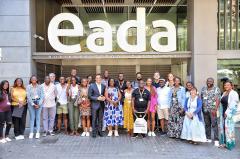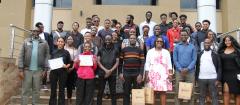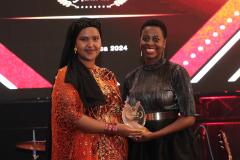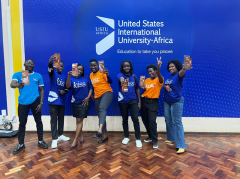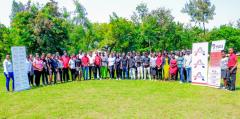Quality higher education indispensable for Africas future
Higher education in Africa and around the world is in a moment of rapid transition and transformation, thanks to the massive disruptions of COVID-19 that have accelerated long-term trends and exposed and exacerbated the sector’s systemic deficiencies and inequalities.
In this presentation, I will examine the past, present and future of African higher education.
First, I look at the enduring challenges facing the sector; second, the agenda for reform and transformation; and third, the desired trajectories for 2050.
The challenges facing HE
The challenges facing African higher education are well known.
First, there is limited institutional supply in terms of the numbers of universities and enrolment ratios. In 2018, there were 1,682 universities in Africa, up from 784 in 2000 and 294 in 1980. Clearly, higher education has experienced explosive growth.
Yet, in global terms, Africa’s share of the world’s 18,772 higher education institutions remained low at 8.9%, compared to 37% for Asia, 21.9% for Europe, 20.4% for North America and 12% for Latin America and the Caribbean.
The total number of students in African higher education institutions in 2017 stood at 14.6 million out of 220.7 million worldwide, or 6.6%.
Second, many African universities suffer from inadequate financial resources, as all major sources are constrained, including tuition fees, auxiliary income, research grants, government subventions, philanthropic donations and concessionary loans.
Third, human capital remains deficient, especially in terms of faculty as African universities are not producing enough graduates with terminal degrees.
Fourth, research output is low. According to the latest UNESCO Science Report 2021, Africa spends only 0.59% of GDP on research and development, compared to a world average of 1.79%.
Not surprisingly, it accounts for a mere 1.01% of global research and development expenditures, 2.50% of global researchers and 3.50% of scholarly publications, compared to 45.7%, 44.5% and 48.0%, respectively for a region such as Asia.
The entire African continent, with a population of 1.3 billion, produces fewer scholarly publications than Canada (3.60%), with a population of 37.7 million!
The data for the cutting-edge fields of the Fourth Industrial Revolution (4IR) (artificial intelligence androbotics, biotechnology, energy, materials, nanoscience and nanotech and opto-electronics) is even more abysmal.
Fifth, infrastructure is often suboptimal. Physical facilities do not always match growth in enrolments and academic programmes, and deferred maintenance is rampant.
Underinvestment in electronic infrastructures became cruelly evident under COVID-19 that led to campus closures and forced universities to transition online for teaching, operations and service delivery, which some universities were unable to do.
Sixth, leadership and governance systems are regularly compromised by external interventions and politicisation, internal dysfunctions, authoritarianism, corruption and lack of leadership development opportunities.
Seventh, as university communities become more disparate and demands grow, academic cultures are more complex and contestations over equity, diversity and inclusion intensify.
Eighth, the quality of graduates remains problematic as evident in persistent mismatches between university education and economic needs that translate into high levels of unemployability.
Ninth, there is the challenge of balancing the historical legacies and contemporary pressures of asymmetrical internationalisation and the enduring demands of intellectual, institutional, ideological decolonisation and indigenisation.
Tenth, African universities do not fare well in international higher education rankings. For example, in the Times Higher Education 2021 World University Rankings, only 60 African universities are included among the 1,500 listed, led by Egypt with 21, followed by South Africa with 10, Algeria eight, Nigeria six, Morocco and Tunisia five each, and one each for Kenya, Uganda and Ghana.
Notwithstanding their problems as instruments of global academic capitalism, rankings have a material impact on the intensifying competition for students, faculty and resources.
Finally, African universities are not immune from the increasingly pernicious features of the contemporary academy.
They include what I call the Five Cs: corporatisation of management (application of often inappropriate business practices in the leadership and management of universities); consumerisation of students (expectations and treatment of students as consumers in a market transaction, not as learners in an educational environment); credentialing of learning (prioritising short-term vocational education in place of intellectually demanding learning and the proficiencies and dispositions of the liberal arts); casualisation of faculty (devaluation of academic labour and growth of adjuncting due to shortage of qualified faculty); and commodification of knowledge (growth of proprietary norms of knowledge production and consumption).
Agenda for reform and transformation
As the popular saying goes, the flip side of a challenge is an opportunity. The same is true of a crisis as devastating and disruptive as COVID-19.
African universities face three scenarios: some will be focused on reclaiming the pre-pandemic past, which is inadvisable. Others will embark on reforms that incorporate the impact and lessons of the pandemic into their culture and vision.
The brave ones will try to use the pandemic to launch or accelerate an institutional transformation agenda. For some, what is at stake is survival, for others stability, and for many sustainability.
I have identified seven areas of reform and transformation.
First, is promoting financial sustainability. This requires governments to raise funding significantly for universities as an essential public good and investment for innovative and inclusive sustainable development and universities establishing differentiated tuition pricing and targeted student aid.
This also requires exercising prudent financial management; aggressively diversifying revenue streams from research grants, auxiliary services, to undertaking entrepreneurial activities, raising donations from alumni, local high net-worth individuals whose numbers are exploding (Frank Knight noted in 2020 there were 231,000 worth nearly US$2 trillion), and local and international philanthropic foundations.
In addition, financial sustainability demands creating institutional mergers for public and private universities that are too small or too similar to survive; forging robust inter-institutional collaborations to leverage resource procurement and academic exchanges; as well as strengthening external partnerships with other higher education institutions, international and intergovernmental organisations and the private sector, including the development of public-private partnerships.
Second, building faculty capacities is imperative. This requires expanding graduate education, postgraduate opportunities, faculty exchanges and transnational and inter-institutional collaborations in teaching, research and public service.
Also, African universities, supported by their governments, should pursue the recruitment, for a specified time, of excess academic labour from countries in the Global North such as the United States, where such labour exists in abundance because of overproduction of terminal degrees and the neo-liberal restructuring of American universities.
Further, the continent should mobilise the academic diaspora. Already, the diaspora is Africa’s biggest donor (remitted US$84,280 billion in 2019); its massive ‘intellectual remittances’ should similarly be marshalled. Robust faculty support is also critical from remuneration to research.
Third, is the need to continually upgrade infrastructure to meet the changing demographics of students, curricula and pedagogical demands of 21st-century higher education.
For physical infrastructures, it is important to build and maintain state-of-the-art and adequate classrooms, laboratories, hostels and sports facilities.
COVID-19 has underscored the need for enhancing electronic infrastructure, digital literacy and skills in African universities.
As part of this agenda, there is a need to embed digital transformation in institutional culture, from strategic planning and organisational structures, to operational processes, to rethink capital expenditures that historically favoured physical contact; develop online design competencies; entrench technology-mediated modalities of teaching and learning encompassing face-to-face, blended and online; and embrace pedagogical changes in terms of curricula design and delivery that involves students as active participants in the learning process rather than passive consumers.
Other aspects that deserve attention are the promotion of holistic and innovative curricula that impart skills for the jobs of the 21st century; adopting and using educational technologies that support the whole student for student success going beyond degree completion and the creation of effective policies and interventions to address the digital divides and issues of mental health disorders and learning disability.
Furthermore, there are safeguarding data protection, security and privacy and the need to pay special attention to international students who face unique barriers.
There is also a need to form meaningful partnerships with external constituencies and stakeholders, including digital technology and telecommunication companies; and anchor research and innovation in the technological infrastructure that supports and enhances the opportunities of the 4IR for Africa.
Fourth, research cultures and productivity must be strengthened.
African countries, governments, the private sector, intergovernmental agencies such as the African Development Bank, the continent’s mushrooming foundations, and the universities, themselves, must fulfil their commitments to raise research funding significantly as a share of GDP to the world average.
Clear and robust research policies and incentives need to be developed to provide adequate support to research-intensive universities and research-oriented faculty.
In this context, it is particularly critical to promote interdisciplinary research on national, regional and global visions, such as the African Union’s Agenda 2063 and the United Nation’s Sustainable Development Goals.
Also critical is the pursuit of open access, brokerage and advisory services, scientific literacy in society, and global standards for research and innovation.
The current discourse tends to pit science, technology, engineering and mathematics, or STEM, disciplines against the humanities and social science, to valorise the former and disparage the latter.
In reality, UNESCO’s report notes, “The relationships between science, society, policy and politics have always been complex and contested …Too often, in the past, perspectives from the social sciences and humanities have been overlooked, despite the reality that human behaviour and sociological dimensions are key to successful decision-making, as demonstrated by the debates on both the COVID-19 pandemic and climate change.”
Fifth, enhancing the quality of graduates is necessary.
This entails strengthening high-impact pedagogical practices that include first-year seminars and experiences; providing common intellectual experiences; learning communities, writing-intensive courses, collaborative assignments and projects; undergraduate research; diversity or global learning; ePortfolios; community and service-based learning; internships; and capstone courses and projects.
The aim should be to cultivate among students lifelong learning skills and mindsets for critical thinking, effective communication, creativity, curiosity, collaboration, problem-solving, adaptability, principled and ethical behaviour and resilience.
Sixth, developing effective leadership requires ensuring that appointments for institutional heads and governance boards are based on verifiable leadership competencies, passion, and understanding of the higher education sector.
Moreover, university leaders at all levels, from department chairs to deans, vice-chancellors to board members, must undergo periodic leadership development training specifically tailored for higher education.
The pandemic has demonstrated the need for university leaders to sharpen their skills in terms of financial acuity, cultural competency, technological deftness, crisis management, entrepreneurial mindset, political savviness, empathy and respect for multiple stakeholders, multi-genre communication, high emotional intelligence and agility.
Finally, promoting social trust and more productive cultures is required for institutional transformation and success.
This entails upholding academic freedom in terms of both freedom of inquiry and institutional autonomy; practising sharing governance in which the roles and responsibilities of faculty, management and governing boards are understood and respected; promoting equity, diversity and inclusion for underrepresented groups as an institutional priority; cultivating a culture of civility and collegiality and curtailing academic bullying and mobbing; developing effective internal and external communication tailored for different stakeholders; and embracing social responsibility and impact as part of an institution’s mission and values.
Visioning African Higher Education in 2050
In March 2015, the First African Higher Education Summit was held in Dakar, Senegal.
The summit identified the challenges and opportunities for African universities in the realisation of the African Union’s Agenda 2063, “a blueprint and master plan for transforming Africa into the global powerhouse of the future … the continent’s strategic framework that aims to deliver on its goal for inclusive and sustainable development …”
I was commissioned to write the framing paper for the summit and help draft the Declaration and Action Plan, which identified eight priorities.
Building on this, I offer a possible vision of the African higher education landscape in 2050, when Africa will have an estimated 2.5 billion people, 25.5% of the world’s population.
Quality and transformative higher education will be indispensable to turn this explosive growth into a demographic dividend rather than a disaster for Africa and the world.
First, by 2050, Africa should have a greatly expanded higher education system with an average enrolment ratio of at least 50%, a system firmly anchored on the values of access, affordability and inclusive excellence.
Second, it should be a financially sustainable, efficient, technologically advanced, locally rooted and globally competitive system that attracts high-quality students, faculty, leaders, research grants, donations and a diverse range of symmetrical and beneficial partnerships.
Third, there should be a comprehensive higher education ecosystem characterised by diversification, differentiation, harmonisation, relevance, flexibility and resilience.
Fourth, African universities should be committed to academic freedom, shared governance and social responsibility.
Fifth, they will be renowned for excellence in teaching and learning, research and scholarship, innovation and entrepreneurship, and public service and engagement.
Sixth, our universities will be engines for transformation with powerful capacities in research, science, technology and innovation that provide solutions for the continent’s and world’s development challenges and visions.
Seventh, they will play a major role in promoting the Pan-African and nationalist agendas of epistemic and economic decolonisation, nation-building, development, democracy, equality, human rights, justice, rule of law and regional integration.
Finally, they will be producing highly skilled, innovative, employable, ethical and civic-minded graduates, informed and engaged citizens.
This future is within our power to create, as leaders of higher education on our beloved continent, by working together with other key stakeholders including governments, intergovernmental organisations, the private sector and civil society.
Let us marshal the necessary political will to bring that future sooner rather than later.
This is an edited version of a presentation on 5 July by Professor Paul Zeleza, the vice-chancellor of the United States International University-Africa, Nairobi, Kenya, at the general conference of the Association of African Universities. The theme of the conference is ‘The Future of Higher Education in Africa’. - University World News Africa Edition

